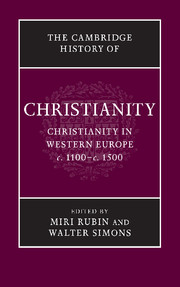Book contents
- Frontmatter
- Introduction
- PART I INSTITUTIONS AND CHANGE: 1100–1200
- PART II FORGING A CHRISTIAN WORLD, 1200–1300
- 5 The theological framework
- 6 The legal underpinnings
- 7 Material support I: parishes
- 8 Material support II: religious orders
- 9 The Word and its diffusion
- PART III THE ERECTION OF BOUNDARIES
- PART IV SHAPES OF A CHRISTIAN WORLD
- PART V CHRISTIAN LIFE IN MOVEMENT
- PART VI THE CHALLENGES TO A CHRISTIAN SOCIETY
- PART VII REFORM AND RENEWAL
- Select bibliography
- Index
- Map 1 Western Europe c. 1100 – c. 1500
- Map 2 Universities of Europe
- References
8 - Material support II: religious orders
from PART II - FORGING A CHRISTIAN WORLD, 1200–1300
Published online by Cambridge University Press: 28 March 2010
- Frontmatter
- Introduction
- PART I INSTITUTIONS AND CHANGE: 1100–1200
- PART II FORGING A CHRISTIAN WORLD, 1200–1300
- 5 The theological framework
- 6 The legal underpinnings
- 7 Material support I: parishes
- 8 Material support II: religious orders
- 9 The Word and its diffusion
- PART III THE ERECTION OF BOUNDARIES
- PART IV SHAPES OF A CHRISTIAN WORLD
- PART V CHRISTIAN LIFE IN MOVEMENT
- PART VI THE CHALLENGES TO A CHRISTIAN SOCIETY
- PART VII REFORM AND RENEWAL
- Select bibliography
- Index
- Map 1 Western Europe c. 1100 – c. 1500
- Map 2 Universities of Europe
- References
Summary
Throughout the Middle Ages the religious orders and the society that they shunned exhibited a mutual dependency. From the early days of Western monasticism, those who entered the cloister spent much of their day engaged in the opus dei, the work of God, the continuous, and communal, round of prayer and worship. This not only enabled them to fulfil their own personal spiritual aspirations, but, increasingly, to perform the social function of intercession for humankind. Monks and nuns prayed particularly for the souls of those who provided them with their material support, and the elaboration of the liturgy through the addition of masses and prayers for the dead reached its apogee in the congregation of the Burgundian abbey of Cluny, founded in 909–10. The twelfth and thirteenth centuries, however, saw great changes in the nature of the material support for institutions within the monastic and religious orders.
Early medieval material support for monastic houses came from a number of sources. The mid-sixth-century Rule of St Benedict hinted that some of the endowment of a monastery might come from the monks themselves. Chapter 58 laid down that an adult recruit who had goods or property must choose whether to bestow it on the monastery or give it to the poor. Chapter 59, which made provision for the offering of children to the monastery, enjoined the parents of a child oblate to ensure that any means of him inheriting property be closed off.
Keywords
- Type
- Chapter
- Information
- The Cambridge History of Christianity , pp. 107 - 113Publisher: Cambridge University PressPrint publication year: 2009

